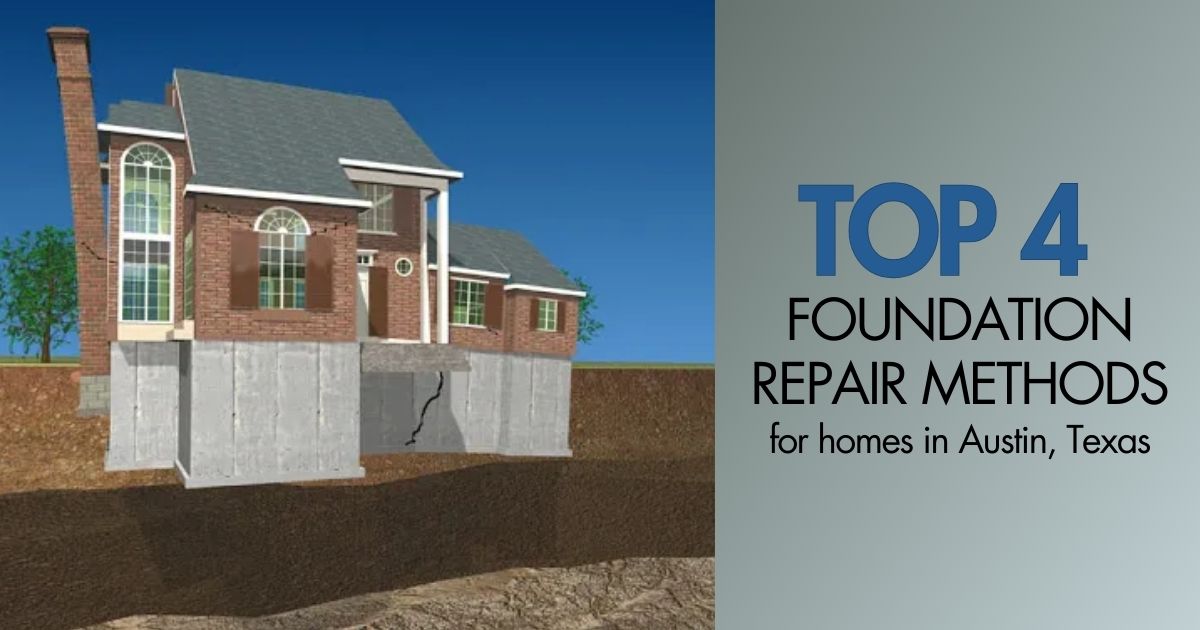512.291.0709
Mon - Fri: 9 AM - 11:30 AM
12:30 PM - 4 PM
October 25, 2023

If you’re here, you likely understand that the foundation of a home is its fundamental support system, and ensuring its stability is crucial for preserving the structural integrity of the entire building.
Homes in the Austin, Texas area, with its unique climate and soil conditions, are certainly no exception. Homeowners in the area often deal with foundation issues due to factors like expansive clay soils, extreme weather, and rapid urban development. Don’t worry – if this happens to you, you don’t have to throw the whole house away. Keep reading, as we’re going to go over the four main foundation repair methods commonly used to address these common challenges.
While there are countless methods to make effective foundation repairs, we found that these are the best options for the soil conditions of the area.
Concrete piers, also known as concrete pilings, are high-strength cylindrical columns that are driven into the ground until they reach stable bedrock or load-bearing soil. This method can be used to level and support a foundation that has settled or shifted.
Concrete piers are well-suited to the clay-rich soils found in the Austin area, capable of effectively stabilizing foundations that have been affected by soil movement. We find, however, that traditional concrete piers have a major weakness – the jacking block.
The jacking block bears the weight of the house and is topped by two concrete top cap cylinders. The problem is that the caps on top of the pier are not concentrically aligned with the pier, and can cause the block to crack or tilt, allowing the foundation to slip off the pier.
To counter this fatal flaw, Douglas Foundation Repair has created the Smart Pier System®, which eliminates the jacking block altogether for a stronger system at no extra cost. We use two piers in the same hole, adding extraordinary strength and stability with fewer holes.
Steel piers are heavy-duty steel beams or pipes that are driven deep into the ground until they reach a stable soil layer. Douglas places each steel pier directly underneath the home’s beam and tops each with three concrete piers for optimal strength. This system provides a high level of structural support and can lift a settled foundation back to its original position.
Steel piers are an excellent choice for addressing foundation issues for both homes and businesses in Austin, as they can penetrate through the expansive clay soils to reach stable strata, and the combination of steel and concrete provide long-lasting strength.
Helical piers are screw-like steel rods with helical plates that are rotated into the ground to support and stabilize a foundation. Unlike concrete and steel pier systems, helical piers do not use the weight of the home to get and stay in place, meaning they eliminate most of the typical stress on the home’s structure during installation. They are especially useful when dealing with poor soil conditions (such as expansive clay soil).
Helical piers can be quickly and easily installed without causing the need for further repairs when the job is done, which does occasionally happen, no matter who is doing the job. Douglas applies our experience and specialized equipment to achieve the correct torque for the required load capacity.
Mudjacking is a remedial process that involves injecting a mixture of grout or polyurethane foam underneath the sunken foundation to lift it back to its original position. It is a cost-effective solution for minor settling issues.
Mudjacking can be an appropriate method for homes in Austin when dealing with minor foundation settlement problems, but it may not be ideal for severe structural issues or extensive repairs. Learn more about mudjacking .
One of the key factors that contribute to foundation issues in the Austin area is the nature of the soil. The presence of expansive clay soils, which expand when they absorb moisture and contract when they dry, can wreak havoc on a home's foundation – that’s why soil stabilization is often a critical consideration when it comes to foundation repair in our region.
Soil stabilization methods are often used in conjunction with the primary foundation repair techniques to help prevent further damage and ensure the longevity of the repairs. Here are some common soil stabilization methods:
This technique involves the injection of non-toxic chemicals, typically lime or cement, that react with the soil, reducing its ability to significantly expand and contract. As a result, the soil becomes more stable and less damaging to a home’s foundation.
Managing the moisture levels around the foundation is important in helping preserve the strength and stability of your home’s foundation. This can be achieved through proper grading, installing drainage systems, and using moisture barriers. By preventing excessive moisture fluctuations in the soil, it will remain more stable, reducing the risk of foundation movement.
Large trees and vegetation near the home can contribute to foundation issues by drawing moisture from the soil. Also, if trees are planted too close to the home, the spreading roots can damage the concrete of your foundation, and if shrubs are planted too close to the home, air flow can become hindered, keeping the area wet. Learn more about managing your landscaping for optimal foundation protection.
Foundation repair in the Austin area is a critical, yet often overlooked, aspect of homeownership due to the region's unique soil conditions and climate. If you suspect issues with your foundation, it's crucial to consult with a professional foundation repair expert who can assess your specific situation and recommend the most effective method for your home. Douglas Foundation Repair is ready to help with all your foundation repair needs. Contact us today to schedule a no-obligation consultation.